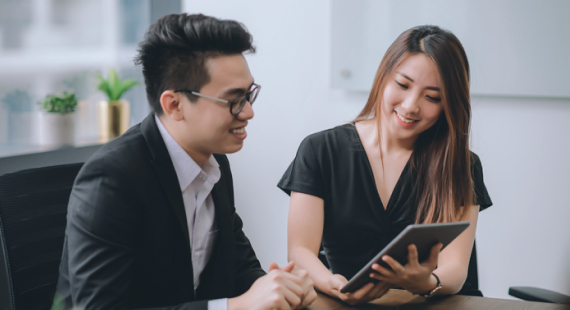
Stakeholder
Engagement
At UOB, we believe that constructive dialogue and collaboration with our stakeholders are important for creating and maintaining meaningful and mutually-beneficial relationships.
Customers
- Interactions at branches (ongoing)
- Face-to-face meetings (ongoing)
- Contact Centre services (ongoing)
- Post-transaction customer surveys (ongoing)
- Marketing and advertising campaigns (ongoing)
- Website and social media channels and campaigns (ongoing)
- Events and seminars, including workshops on sustainability (as and when appropriate)
Colleagues
- CEO communications to all colleagues on regular and topical subjects (quarterly, and as and when appropriate)
- Head of Group Human Resources’ communications to all colleagues on employee-related initiatives (as and when appropriate)
- One-on-one sessions with managers (regularly)
- Online employee portal with informative, collaborative and social features (ongoing)
- Performance reviews (half-yearly)
- Employee engagement surveys (annually)
- Town hall meetings (annually)
- Training and workshops (ongoing)
- ‘Speak Up’ initiative for colleagues to raise issues for action and resolution (ongoing)
Community
- Support of national movements to build inclusive communities (ongoing)
- Fundraising events (annually)
- Regional art competitions (annually)
- Collaborations with customers, business partners, art institutions, social service organisations and Community Development Councils (ongoing)
- Art roadshows and outreach programmes (as and when appropriate)
- Education programmes for children (ongoing)
- Financial literacy programmes (as and when appropriate)
- Donations in cash or in kind to support causes related to art, children and education (as and when appropriate)
- Employee volunteerism (ongoing)
Suppliers
- Requests for quotations and proposals (as and when appropriate)
- Vendor briefings (as and when appropriate)
- Purchase agreements (as and when appropriate)
- Performance reviews (annually or prior to contract expiry)
- Acknowledgement of UOB Group Supplier Sustainability Principles (as and when appropriate)
Governments and regulators
- Regular meetings and engagement (as and when appropriate)
- Consultations with regulatory bodies (as and when appropriate)
- Annual and sustainability reports (annually)
- Audit reports (ongoing)
Other financial institutions, and industry and trade associations
- Participation in industry associations (ongoing)
- Industry-wide workgroups and meetings (as and when appropriate)
- Forums and conferences (as and when appropriate)
Investors and analysts
- Financial reporting and results briefings (quarterly)
- Periodic meetings with rating agencies (at least once a year)
- General meetings with shareholders (annually)
- Annual and sustainability reports (annually)
- SGXNet announcements (as and when appropriate)
- Presentations, conferences and roadshows (ongoing)
- UOB Corporate Day (annually)
- Feedback from analyst surveys (ongoing)
- Feedback from institutional investors and analysts on our ESG performance (ongoing)
Media
- News releases and media statements (ongoing)
- In-person and online conversations (ongoing)
- Media briefings and conferences (as and when appropriate)
- Media interviews (as and when appropriate)
- Social media platforms (ongoing)
- Economic and market research reports and white papers (as and when appropriate)
Non-governmental organisations (NGOs)
- Face-to-face meetings and conference calls (as and when appropriate)
- Conferences and seminars (as and when appropriate)
- Cooperation in joint programmes (ongoing)
International alliances
- Participation in working groups or focus groups to help shape policies or initiatives that support a just transition
Related

Strategy
Our sustainability strategy is embedded in our business and aligns with the UN SDGs.

Materiality
We identify material ESG factors which matter most to our business.

Governance
Our sustainability governance framework guides our approach to conducting business.



